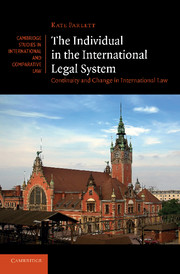Foreword
Published online by Cambridge University Press: 19 May 2011
Summary
The reach of the international legal system beyond traditional inter-state relations has been the subject of much writing in recent times. Work lamenting the inability of the international legal system to address the challenges of non-state actors obscures, in large part, the reality that the system has come a long way in a short time. Sir Hersch Lauterpacht, one of the first and most fervent advocates for recognition of individuals as subjects of international law, wrote in 1947 that ‘[a]s a rule, the subjects of the rights and duties arising from the Law of Nations are States solely and exclusively’. Only a few years later, the International Court of Justice recognised that the United Nations was an international legal person; within a decade one could hardly doubt that the individual had a certain standing in international law, albeit in a specialised way. The international legal system, although principally controlled by states, now encompasses a broad range of actors, including with increasing regularity, individuals.
Kate Parlett's study examines afresh one of the classical topics of public international law: the position of the individual in the international legal system. This is – remarkably – the first general work on the individual's standing in international law since the 1960s, and the first study which addresses the topic in a systematic and comprehensive way, explaining how the individual engages and is engaged by international law across a number of fields, covering those areas of international law which are the most significant for individuals.
- Type
- Chapter
- Information
- The Individual in the International Legal SystemContinuity and Change in International Law, pp. xiii - xivPublisher: Cambridge University PressPrint publication year: 2011

